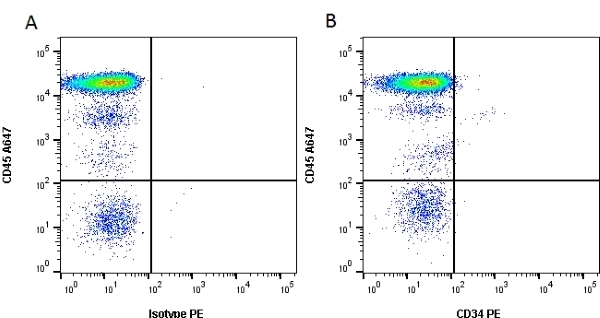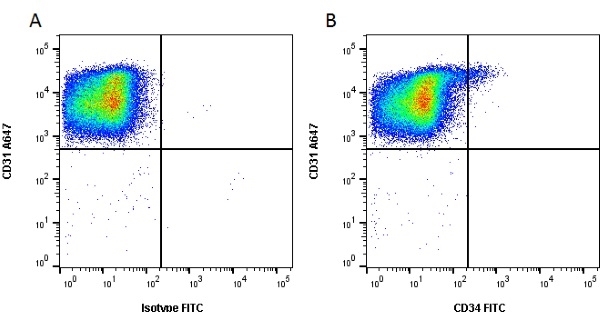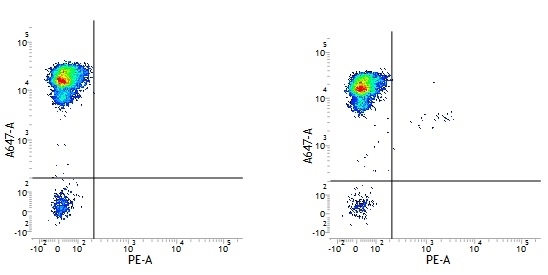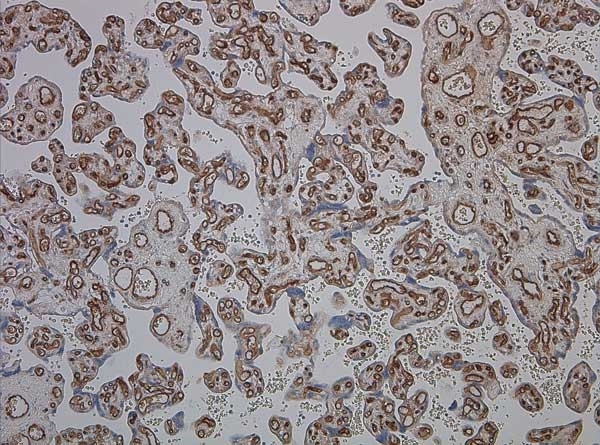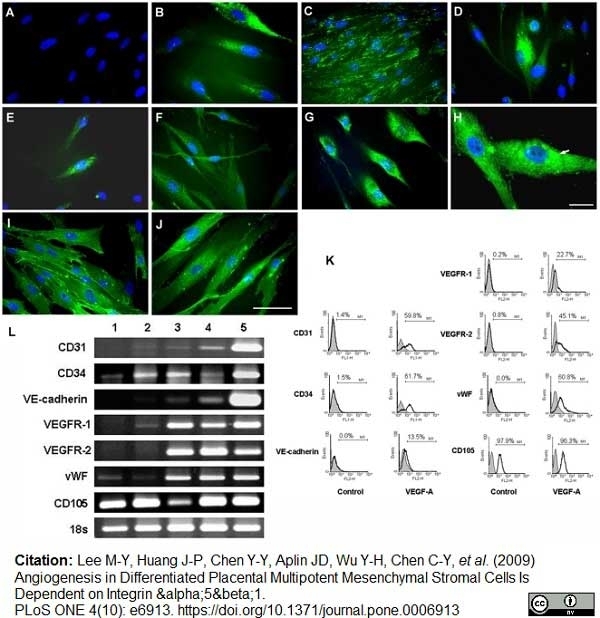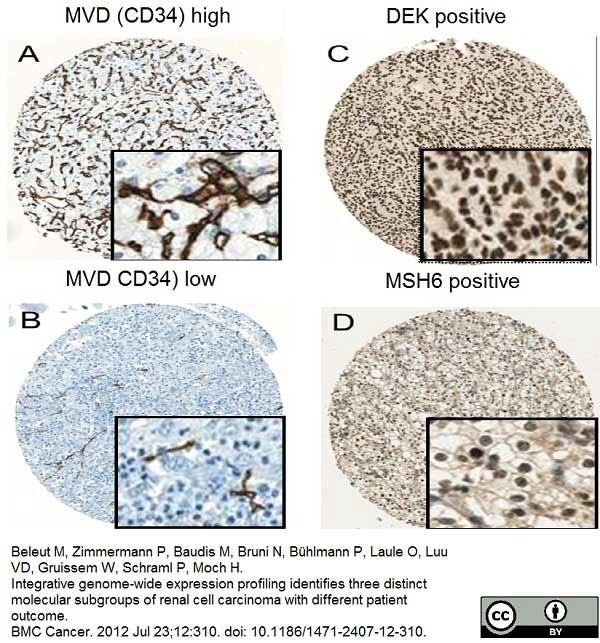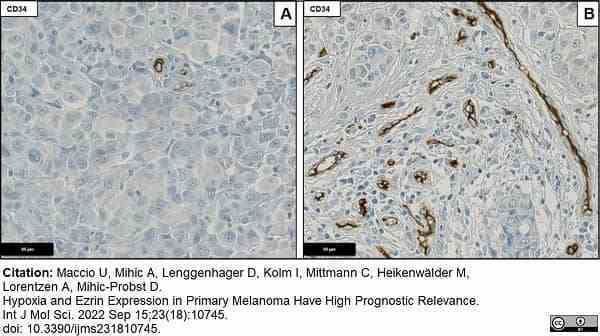CD34 antibody | QBEND/10







Mouse anti Human CD34:RPE
- Product Type
- Monoclonal Antibody
- Clone
- QBEND/10
- Isotype
- IgG1
- Specificity
- CD34
- Region
- CLASS II
| Mouse anti Human CD34 antibody, clone QBEND/10 recognizes the human CD34 antigen, also known as Hematopoietic progenitor cell antigen CD34. Human CD34 is 385 amino acid polypeptide containing a 31 residue signal peptide, cleaved to yield the ~110kDa mature form of CD34, a sialomucin single pass transmembrane glycoprotein. CD34 is expressed by stem cells (Kaufman et al. 2001) and small vessel endothelium (Ramani et al. 1990) Human CD34 exists as two isoforms, the full length form described here and a truncated isoform lacking the carboxy-terminal of the intracellular domain and containing some alternative sequence in the remaining intracellular region. Antibody binding epitopes on human CD34 have been classified according to their resistance to enzymatic degradation and grouped together using this and competitive binding assays (Lanza et al. 1999). Mouse anti Human CD34 antibody, clone QBEND/10 has been classified as binding to the class II epitope, resistant to neuraminidase treatment but sensitive to both glycoprotease and chymopapain digestion. Mouse anti Human CD34 antibody, clone QBEND/10 binds to a different eoptope to Mouse anti Human CD34, clone 581 which binds to the class III epitope resistant to all three enzymzatic treatments (Nishio et al. 1996 In Leukocyte Typing VI). Clone QBEND 10 is expected to bind to both isoforms of human CD34 as it's binding epitope has been mapped to the extracellular domain between amino acids 43 and 49 by peptide microarray analysis (Jones et al. 1996, in Leukocyte Typing VI). Mouse anti Human CD34 antibody, clone QBEND/10 has been successfully exploited for the detection of CD34 in brain capillaries of Alzheimer's patients (Kalaria et al. 1992) and in acute lymphoblastic leukemia cells (Sutherland et al. 1992) by western blotting. |
- Target Species
- Human
- Species Cross-Reactivity
-
Target Species Cross Reactivity Bovine Sheep Rat Dog Cynomolgus monkey Rhesus Monkey - N.B. Antibody reactivity and working conditions may vary between species.
- Product Form
- Purified IgG conjugated to R. Phycoerythrin (RPE) - lyophilized
- Reconstitution
- MCA547PET: Reconstitute with 0.25 ml distilled water
- MCA547PE: Reconstitute with 1 ml distilled water
- Preparation
- Purified IgG prepared by affinity chromatography on Protein A from tissue culture supernatant
- Buffer Solution
- Phosphate buffered saline
- Preservative Stabilisers
-
MCA547PET:
0.09% Sodium Azide 1% Bovine Serum Albumin 5% Sucrose -
MCA547PE: 0.09% Sodium Azide (NaN3)
1% Bovine Serum Albumin
5% Sucrose - Immunogen
- Human endothelial cell membrane vesicles.
- Fusion Partners
- Spleen cells from immunized NZB mice were fused with cells of the mouse NSO myeloma cell line.
- Max Ex/Em
-
Fluorophore Excitation Max (nm) Emission Max (nm) RPE 488nm laser 496 578 - Regulatory
- For research purposes only
- Guarantee
- 12 months from date of despatch
After reconstitution store at +4oC.
DO NOT FREEZE. This product should be stored undiluted. This product is photosensitive and should be protected from light. Should this product contain a precipitate we recommend microcentrifugation before use.
DO NOT FREEZE.
This product should be stored undiluted. This product is photosensitive and should be protected from light. Should this product contain a precipitate we recommend microcentrifugation before use.
| Application Name | Verified | Min Dilution | Max Dilution |
|---|---|---|---|
| Flow Cytometry | Neat | Neat Pack Size: 25 Tests/0.25ml 1/10 Pack Size: 100 Tests |
- Flow Cytometry
- Use 10ul of the suggested working dilution to label 1 x 106 cells in 100ul.
How to Use the Spectraviewer
Watch the Tool Tutorial Video ▸- Start by selecting the application you are interested in, with the option to select an instrument from the drop down menu or create a customized instrument
- Select the fluorophores or fluorescent proteins you want to include in your panel to check compatibility
- Select the lasers and filters you wish to include
- Select combined or multi-laser view to visualize the spectra
| Description | Product Code | Applications | Pack Size | List Price | Your Price | Quantity | |
|---|---|---|---|---|---|---|---|
| Mouse IgG1 Negative Control:RPE | MCA928PE | F | 100 Tests | Log in | |||
| List Price | Your Price | ||||||
| Log in | |||||||
| Description | Mouse IgG1 Negative Control:RPE | ||||||
| Description | Product Code | Applications | Pack Size | List Price | Your Price | Quantity | |
|---|---|---|---|---|---|---|---|
| Human Seroblock | BUF070A | F | 50 Test | Log in | |||
| List Price | Your Price | ||||||
| Log in | |||||||
| Description | Human Seroblock | ||||||
| Human Seroblock | BUF070B | F | 200 Test | Log in | |||
| List Price | Your Price | ||||||
| Log in | |||||||
| Description | Human Seroblock | ||||||
References for CD34 antibody
-
Fina, L. et al. (1990) Expression of the CD34 gene in vascular endothelial cells.
Blood. 75 (12): 2417-26. -
Sauer, G. et al. (2003) Progression of cervical carcinomas is associated with down-regulation of CD9 but strong local re-expression at sites of transendothelial invasion.
Clin Cancer Res. 9: 6426-31. -
Rutella, S. et al. (2003) Identification of a novel subpopulation of human cord blood CD34-CD133-CD7-CD45+lineage- cells capable of lymphoid/NK cell differentiation after in vitro exposure to IL-15.
J Immunol. 171: 2977-88. -
Chan-Ling, T. et al. (2004) Astrocyte-endothelial cell relationships during human retinal vascular development.
Invest Ophthalmol Vis Sci. 45: 2020-32. -
Zhao, M. et al. (2007) Evidence for the presence of stem cell-like progenitor cells in human adult pancreas.
J Endocrinol. 195: 407-14. -
Jokubaitis, V.J. et al. (2008) Angiotensin-converting enzyme (CD143) marks hematopoietic stem cells in human embryonic, fetal, and adult hematopoietic tissues.
Blood. 111: 4055-63. -
Lee, M.Y. et al. (2009) Angiogenesis in differentiated placental multipotent mesenchymal stromal cells is dependent on integrin alpha5beta1.
PLoS One. 4: e6913. -
Chan-Ling T et al. (2011) Evidence of hematopoietic differentiation, vasculogenesis and angiogenesis in the formation of human choroidal blood vessels.
Exp Eye Res. 92 (5): 361-76.
View The Latest Product References
-
Shetty, S. et al. (2011) Common lymphatic endothelial and vascular endothelial receptor-1 mediates the transmigration of regulatory T cells across human hepatic sinusoidal endothelium.
J Immunol. 186: 4147-55. -
Chan-Ling T (2011) Role of CD44+ Stem Cells in Mural Cell Formation in the Human Choroid: Evidence of Vascular Instability Due to Limited Pericyte Ensheathment.
Invest Ophthalmol Vis Sci. 52: 399-410. -
Beleut M et al. (2012) Integrative genome-wide expression profiling identifies three distinct molecular subgroups of renal cell carcinoma with different patient outcome.
BMC Cancer. 12: 310. -
Suzuki, M. et al. (2012) Induction of human humoral immune responses in a novel HLA-DR-expressing transgenic NOD/Shi-scid/γcnull mouse.
Int Immunol. 24 (4): 243-52. -
Hsieh, J.Y. et al. (2013) miR-146a-5p circuitry uncouples cell proliferation and migration, but not differentiation, in human mesenchymal stem cells.
Nucleic Acids Res. 41 (21): 9753-63. -
Chen, S.P. et al. (2014) Reduced circulating endothelial progenitor cells in reversible cerebral vasoconstriction syndrome.
J Headache Pain. 15: 82. -
Junaid TO et al. (2014) Fetoplacental vascular alterations associated with fetal growth restriction.
Placenta. 35 (10): 808-15. -
Grognuz, A. et al. (2016) Human Fetal Progenitor Tenocytes for Regenerative Medicine.
Cell Transplant. 25 (3): 463-79. -
Fan, C.Y. et al. (2017) De novo protein sequencing, humanization and in vitro effects of an antihuman CD34 mouse monoclonal antibody.
Biochem Biophys Rep. 9: 51-60. -
Wang, D.Y. et al. (2017) Histological component quantification for the evaluation of endometrial receptivity in women with natural cycles undergoing in vitro fertilization/intracytoplasmic sperm injection.
Taiwan J Obstet Gynecol. 56 (3): 368-70. -
GarikipatiV, N.S. et al. (2018) Isolation and characterization of mesenchymal stem cells from human fetus heart.
PLoS One. 13 (2): e0192244. -
Rodewald, A.K. et al. (2019) Eight autopsy cases of melanoma brain metastases showing angiotropism and pericytic mimicry. Implications for extravascular migratory metastasis.
J Cutan Pathol. 46 (8): 570-8. -
Maccio, U. et al. (2022) Hypoxia and Ezrin Expression in Primary Melanoma Have High Prognostic Relevance.
Int J Mol Sci. 23 (18): 10745. -
Weible, M.I. et al. (2024) BMPRII(+) neural precursor cells isolated and characterized from organotypic neurospheres: an in vitro model of human fetal spinal cord development.
Neural Regen Res. 19 (2): 447-57. -
Tripathy, N.K. et al. (2018) Cardiomyogenic Heterogeneity of Clonal Subpopulations of Human Bone Marrow Mesenchymal Stem Cells.
J Stem Cells Regen Med. 14 (1): 27-33. -
Hill, W. et al. (2024) Late transplant-associated thrombotic microangiopathy verified in bone marrow biopsy specimens is associated with chronic GVHD and viral infections.
Eur J Haematol. Jan 20 [Epub ahead of print].
Further Reading
-
Gorr, T.A. et al. (2011) Old proteins - new locations: myoglobin, haemoglobin, neuroglobin and cytoglobin in solid tumours and cancer cells.
Acta Physiol (Oxf). 202: 563-581.
- RRID
- AB_1125257
- UniProt
- P28906
- Entrez Gene
- CD34
- GO Terms
- GO:0016021 integral to membrane
- GO:0030246 carbohydrate binding
- GO:0009897 external side of plasma membrane
- GO:0016337 cell-cell adhesion
- GO:0050776 regulation of immune response
- GO:0050900 leukocyte migration
MCA547PET
MCA547PE
If you cannot find the batch/lot you are looking for please contact our technical support team for assistance.
Please Note: All Products are "FOR RESEARCH PURPOSES ONLY"
View all Anti-Human ProductsAlways be the first to know.
When we launch new products and resources to help you achieve more in the lab.
Yes, sign me up